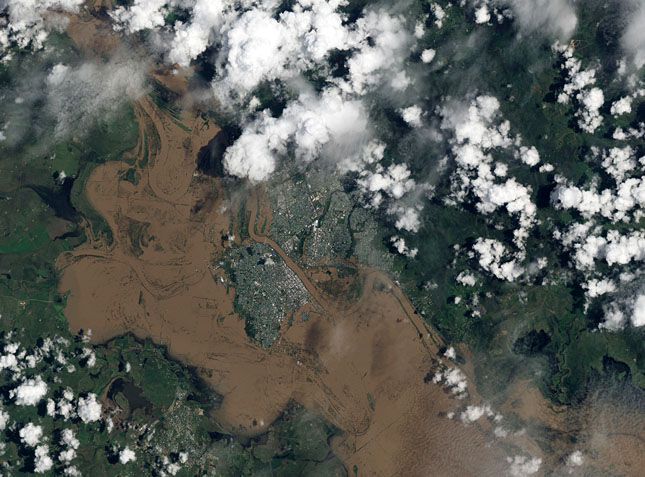-
Kerry Announces New Task Force to Integrate Climate Change and Security Issues Into U.S. Foreign Policy
November 13, 2015 By Lauren Herzer Risi
In a commanding speech at Old Dominion University this week, Secretary Kerry announced a dramatic step toward integrating climate and security into U.S. foreign policy. In Norfolk, Virginia, home to the world’s largest naval station, Kerry said the State Department is creating a new “task force of senior government officials to determine how best to integrate climate and security analysis into overall foreign policy planning and priorities.”
The Defense Department and military leaders have been on the frontlines of understanding the security impacts of climate change, from sea-level rise threatening military installations like those at Norfolk to the competing demands of responding to humanitarian crises caused by extreme weather events.
“Just as the Pentagon has begun to view our military planning through a climate lens, ultimately, we have to integrate climate considerations into every aspect of our foreign policy, from development and humanitarian aid to peacebuilding and diplomacy,” Kerry said. “And that starts with getting a better understanding of the complex links between climate change and national security.”
This announcement is an important culmination in a long process to understand and incorporate into decision-making how climate change is affecting states.
In 2014, Secretary Kerry and his G7 Foreign Minister colleagues commissioned an independent report on climate change and fragility. Produced by an international consortium including the Wilson Center, and launched here, the report identified resource competition; livelihood insecurity and migration; extreme weather events; food insecurity; water insecurity; sea-level rise; and the unintended effects of climate policies as among the challenges posed by climate change to states and societies in fragile or unstable situations.
Chief among the recommendations that emerged from the report was that G7 governments, responsible for the majority of the world’s development aid, should make these “climate-fragility risks” a central foreign policy priority.
Kerry’s announcement appears to answer that call and go even further. As noted by the report, taking into account climate-fragility risks in U.S. foreign policy will require the development of new capacities within and across government departments and sectors; integrated methodologies and tools for climate-fragility risk assessment; and working closely with those countries most affected by climate vulnerability and fragility.
In his speech, Kerry takes up those recommendations. Without skipping a beat, he followed the announcement of the task force with an example of how U.S. embassies can begin integrating climate impacts into strategic plans “so that our diplomats can work with host countries to focus on prevention – to proactively address climate-driven stresses on people’s livelihoods, health, and security and to do it before it evolves into deep grievances that fuel conflicts.”
Given the “threat-multiplier” effect we have already observed in many places around the world, collaboration on climate risk assessment should be part and parcel of every one of our diplomatic relationships, and we will see to it that it is.
We’re also working closely with the U.S. Agency for International Development to improve our conflict early warning and prevention capability. The U.S. Government currently employs state-of-the-art tools to help address the fragility and risk of instability around the world. By overlaying an analysis of climate vulnerability with those assessments, we think we’ll be able to better identify areas where combined risks are particularly high and where there are critical opportunities for conflict prevention and resilience before it is too late.
And here’s the upshot: If we can better identify “red flags” of risk around the world, we can better target our diplomacy and development assistance in order to enable those nations to become more resilient, more secure, and less likely to fall into a full-fledged war or humanitarian crisis.
Kerry concluded his speech with a nod toward COP-21 in Paris:
I’m not going to tell you that a global climate agreement is going to be the silver bullet that eliminates the threat posed by climate change. But the truth is we won’t eliminate it without an agreement in Paris. And the kind of agreement that we’re working toward is one that will prove that the world’s leaders finally understand the scope of the challenge that we are up against.
Let’s hope this momentum towards an integrated approach to climate and security continues through the UN climate summit, the Sustainable Development Goals process, and beyond. To account for the effects of climate change in this rapidly changing and interconnected world, governments must change how they do business. Kerry’s statements have been eagerly anticipated by those in the climate and security community, but they are important for anyone working across sectors.
Sources: U.S. Department of State.
Photo Credit: Flooding in Rockhampton, Australia, January 2011, courtesy of Jesse Allen/NASA. Video: The Virginian-Pilot.
 A Publication of the Stimson Center.
A Publication of the Stimson Center.



